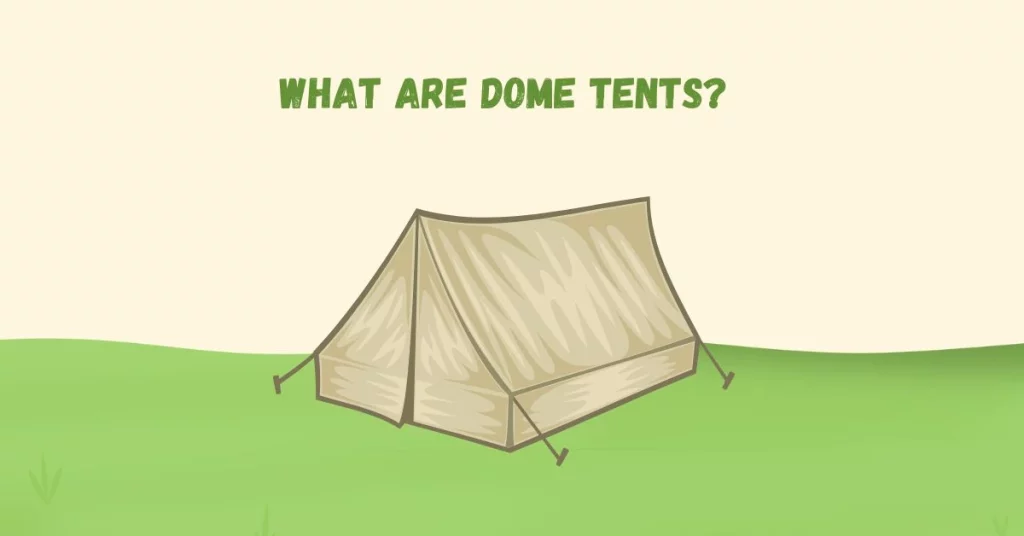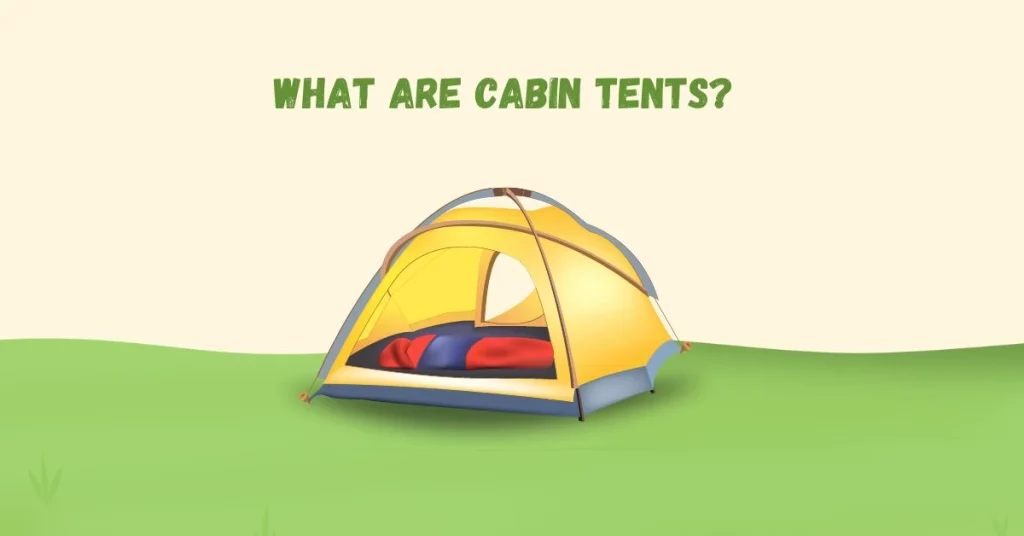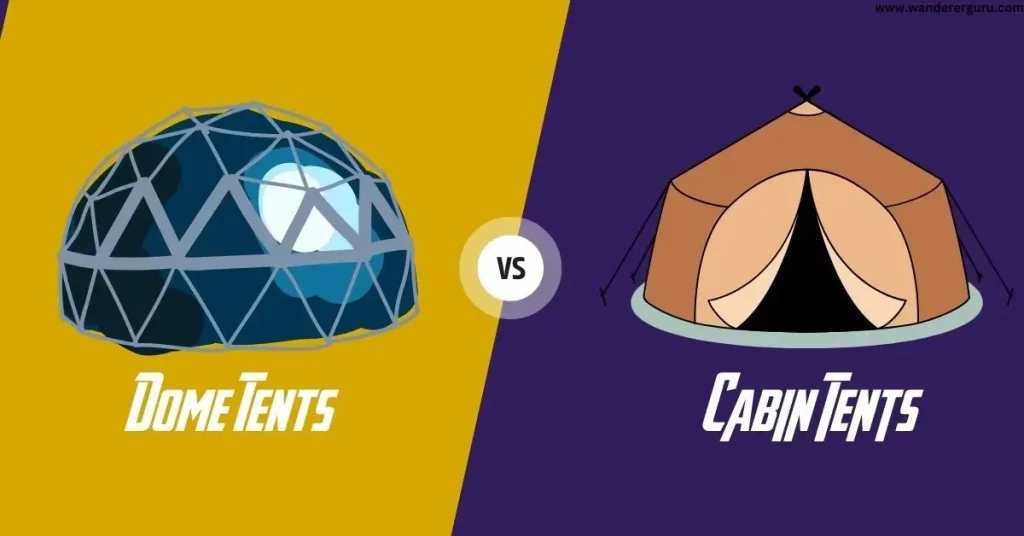When planning an outdoor adventure, one of the crucial decisions you’ll face is selecting the right tent. Dome tents and cabin tents are two popular options that offer distinct features and benefits.
In this article, we will compare and contrast dome and cabin tents to help you make an informed choice for your next camping trip. So, let’s dive in and explore the differences between these two tent types.
What are Dome Tents?

Dome tents are characterized by their unique shape, featuring two flexible poles that intersect to form a dome-like structure. They are lightweight, easy to set up and offer excellent stability in windy conditions. Dome tents typically come in various sizes, accommodating anywhere from one to several occupants.
Advantages of Dome Tents
Dome tents have several advantages that make them a popular choice among outdoor enthusiasts:
- Easy Setup: Dome tents are designed for quick and hassle-free assembly. The flexible poles and simple construction make them user-friendly, even for beginners.
- Stability: The dome shape of these tents provides excellent stability. The arched structure helps distribute wind forces evenly, reducing the risk of collapsing during gusty conditions.
- Lightweight: Dome tents are generally lighter compared to cabin tents. This feature makes them ideal for backpackers and hikers who value lightweight gear.
- Versatility: Dome tents are available in various sizes, from compact solo tents to larger models that accommodate multiple people. They offer flexibility for solo adventurers, couples, or small groups.
Disadvantages of Dome Tents
While dome tents have many advantages, it’s essential to consider their limitations as well:
- Interior Space: The sloping walls of dome tents can limit the headroom and usable space, especially towards the sides. Taller individuals may find it challenging to move around comfortably.
- Storage Options: Dome tents may offer less internal storage space than cabin tents. If you have multiple gear items or require extra storage, it’s worth considering additional solutions.
Bonus:
How to keep snakes away from your campsite?
What are Cabin Tents?

Cabin tents, as the name suggests, resemble small cabins and provide a more spacious and room-like camping experience. They feature near-vertical walls and a taller peak height, maximizing headroom and interior space.
Advantages of Cabin Tents
Cabin tents come with several advantages that make them appealing to individual campers:
- Ample Space: Cabin tents offer generous headroom and vertical walls, providing a spacious and comfortable environment. This feature primarily benefits families or campers, prioritising comfort and mobility within the tent.
- Storage Capacity: The near-vertical walls in cabin tents create more usable space for storing gear and personal belongings. This additional storage can help keep the tent’s interior organized and clutter-free.
- Privacy: The straighter walls of cabin tents offer better privacy than dome tents. The increased vertical space allows for separate rooms or dividers, providing privacy within the tent.
- Comfort: Cabin tents often have additional features like built-in flooring, room dividers, and oversized windows. These features enhance comfort and convenience, creating a more home-like camping experience.
Disadvantages of Cabin Tents
While cabin tents have their advantages, it’s essential to consider their limitations as well:
- Weight and Bulkiness: Cabin tents are generally heavier and bulkier than dome tents. Their larger size and additional features make them less suitable for backpacking or frequent relocation trips.
- Setup Complexity: Due to their larger size and more intricate design, cabin tents can be more challenging than dome tents. It may require more time and effort, especially for first-time users.
Bonus:
Factors to Consider When Choosing
When deciding between dome tents and cabin tents, it’s essential to consider your particular needs and camping preferences. Here are some key factors to consider:
Durability
Both dome tents and cabin tents can be made from durable materials. However, the overall durability may vary depending on the specific brand, model, and quality of construction. Look for tents with robust materials, reinforced seams, and sturdy poles for longevity.
Portability
If you prioritize portability and ease of transportation, dome tents are generally a better choice. They are lightweight, compact, and easier to pack compared to more significant and bulkier cabin tents.
Interior Space
Consider the number of occupants and the space required inside the tent. Cabin tents provide ample headroom and spacious interiors, making them ideal for families or campers who value comfort and freedom of movement. Dome tents are more suitable for solo or small-group camping where a smaller footprint is preferred.
Weather Resistance
Evaluate the weather conditions you expect to encounter during your camping trips. Dome tents, with their aerodynamic shape, offer better wind resistance. Cabin tents, on the other hand, may have a sturdier construction and better resistance against heavy rain or snow.
Setup and Ease of Use
If you prioritize quick and effortless setup, dome tents are the way to go. Their simple and intuitive design allows for easy assembly. Cabin tents, while providing more features and space, may require more time and effort to set up. For more ideas visit my Pinterest.
Price
Consider your budget when choosing between dome tents and cabin tents. Dome tents tend to be more budget-friendly, while cabin tents, with their added features and larger size, can be pricier.
Dome Tents vs Cabin Tents What’s The difference?
The main difference between dome and cabin tents is their design and structure. Dome tents have a curved, dome-shaped system supported by flexible poles that cross over each other, while cabin tents have a rectangular or square shape with nearly vertical walls resembling a small cabin.
Choosing between a dome tent and a cabin tent depends on your specific needs and preferences. A dome tent might be the best option if you prioritize portability and ease of setup and travel solo or with a small group. On the other hand, if you value spaciousness and vertical space and plan to camp with larger groups or for longer durations, a cabin tent is more suitable.
Conclusion
In conclusion, when comparing dome tents and cabin tents, it’s essential to consider your specific camping needs. Dome tents are lightweight and easy to carry, suitable for backpackers and hikers. Cabin tents provide spacious interiors and comfortable standing height, making them ideal for family camping trips. Consider the size, portability, and desired features to choose the tent that best suits your outdoor adventures.
FAQs
Q.1 Are dome tents or cabin tents better for solo camping?
Ans: Dome tents are generally more suitable for solo camping due to their lightweight and compact design.
Q.2 Can cabin tents be used for backpacking trips?
Ans: Cabin tents are not ideal for backpacking due to their larger size and weight. They are better suited for car camping or longer stays at a campground.
Q.3 Do dome tents provide enough protection in windy conditions?
Ans: Dome tents are designed to offer good stability and withstand moderate winds. However, it’s essential to stake properly and guy out of the tent to enhance its wind resistance.
Q.4 Are cabin tents more expensive than dome tents?
Ans: Generally, cabin tents are pricier than dome tents due to their larger size, added features, and higher-quality construction.
Q.5 Can cabin tents accommodate large families?
Ans: Yes, cabin tents are well-suited for accommodating large families. They offer ample space, room dividers, and storage options, making them comfortable for extended camping trips.
Bonus:

